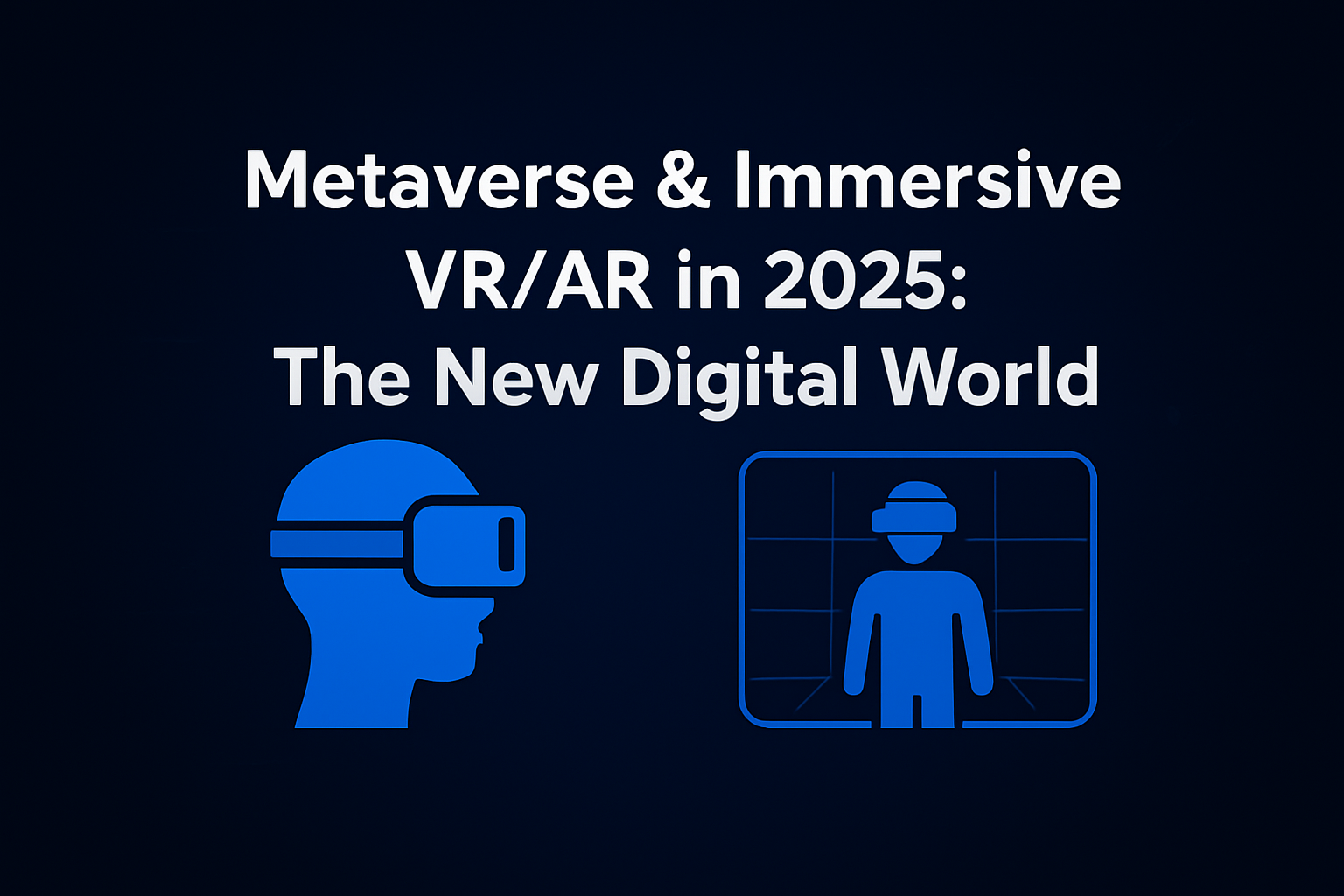Introduction
When Facebook rebranded itself as Meta in 2021, many thought the “Metaverse” was just hype. But fast forward to 2025, and immersive Virtual Reality (VR) and Augmented Reality (AR) are becoming part of daily life in the USA.
From gaming to healthcare, from education to marketing — the Metaverse is building a digital economy worth billions. Big tech companies like Meta, Apple, and Microsoft are competing to create platforms where people can work, shop, and socialize without leaving home.
Let’s explore the biggest Metaverse & immersive VR/AR trends of 2025, why they matter, and what the future holds.
What is the Metaverse?
The Metaverse is a shared digital space where people interact through VR headsets, AR glasses, or even mobile devices. Think of it as a combination of:
- Social media
- Gaming
- Virtual offices
- E-commerce
👉 Example: Instead of attending a meeting on Zoom, imagine walking into a 3D virtual office with your avatar.
Immersive VR/AR in 2025
VR and AR are the main tools powering the Metaverse:
- Virtual Reality (VR): Fully digital environments using headsets. Popular in gaming and training.
- Augmented Reality (AR): Digital information layered on the real world (like Apple Vision Pro or AR glasses).
In 2025, the hardware is finally catching up with the vision:
- Lighter VR headsets
- AR smart glasses with built-in AI
- Faster 5G/6G networks for real-time experiences
(External Source: TechCrunch VR/AR Updates)
Latest Metaverse Breakthroughs in 2025
1. Virtual Offices & Remote Work
Companies in the USA are shifting from Zoom calls to immersive Metaverse workspaces.
- Teams collaborate in 3D environments
- Digital whiteboards replace traditional slides
- AI assistants guide meetings
👉 For marketers, this shift connects with AI SEO Trends 2025, since digital interactions are changing how businesses reach customers.
2. Healthcare Training & Therapy
Doctors use VR to practice surgeries. Patients get AR-based therapy for anxiety, phobias, and even physical recovery.
(External Source: Wired on Health Tech)
3. Gaming & Entertainment
Gaming remains the heart of VR/AR. Platforms like Roblox, Fortnite, and Meta Horizon Worlds are growing into virtual economies. Players buy clothes, land, and even music concerts inside the Metaverse.
👉 Just like AI keyword research helps marketers find profitable trends, VR gaming platforms are teaching businesses how to monetize virtual audiences.
4. Education & Learning
Schools and universities use VR classrooms where students can “travel” to ancient Rome or explore the solar system without leaving their homes.
5. Smart Cities & Digital Twins
The Metaverse is not only for fun. Governments are using digital twin technology to simulate traffic, weather, and city planning inside the Metaverse.
Business Opportunities in the Metaverse
A. Virtual Real Estate
- Buy and sell land inside platforms like Decentraland or The Sandbox.
- Companies open virtual stores where customers can browse products in 3D.
B. Marketing & SEO
Brands advertise inside the Metaverse using 3D billboards and immersive ads.
👉 To succeed, they must adapt strategies like energy-efficient computing to power huge data servers without harming the planet.
C. E-Commerce & Shopping
Customers try clothes virtually before buying. AR mirrors are becoming common in retail.
Challenges of the Metaverse
- High Costs – VR/AR hardware is still expensive.
- Privacy Issues – More data collection means bigger risks.
- Digital Addiction – Spending too much time in virtual spaces.
- Regulation – Governments in the USA are debating rules for digital assets.
(External Source: WSJ on Tech Regulation)
Future of Metaverse & VR/AR Beyond 2025
By 2030, experts predict:
- 1 billion people will spend at least 1 hour daily in the Metaverse.
- AR glasses will replace smartphones as the main digital device.
- Businesses will treat virtual offices as normal as emails today.
FAQs About Metaverse & VR/AR
Q1: Is the Metaverse only for gamers?
No. It’s also used in healthcare, education, marketing, and even government planning.
Q2: What devices are needed for the Metaverse?
VR headsets, AR glasses, or even a smartphone with strong internet.
Q3: Can small businesses benefit from the Metaverse?
Yes! They can open virtual stores, advertise products, and reach global customers.
Conclusion
The Metaverse and immersive VR/AR are no longer science fiction. In 2025, they are reshaping how we work, learn, shop, and socialize.
Businesses that adapt early will gain a competitive edge — whether it’s using virtual offices, digital twins, or AI-powered SEO strategies. The line between the real and virtual world is disappearing fast.
The future is clear: the Metaverse is not just a trend. It’s the next evolution of the internet.
